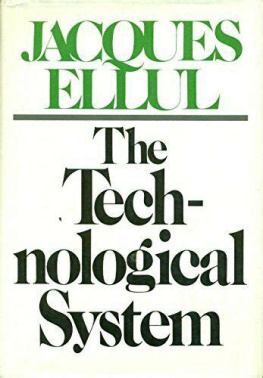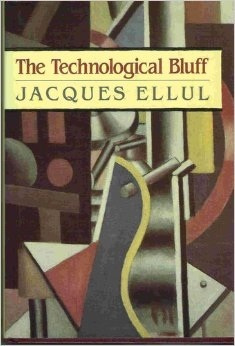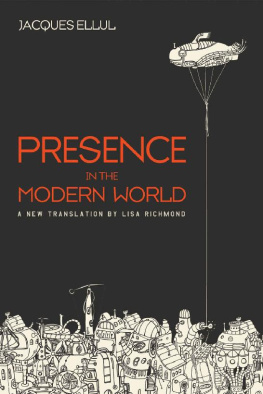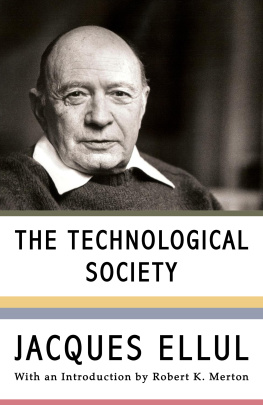Jacques Ellul - The technological system
Here you can read online Jacques Ellul - The technological system full text of the book (entire story) in english for free. Download pdf and epub, get meaning, cover and reviews about this ebook. year: 1980, publisher: Continuum, genre: Politics. Description of the work, (preface) as well as reviews are available. Best literature library LitArk.com created for fans of good reading and offers a wide selection of genres:
Romance novel
Science fiction
Adventure
Detective
Science
History
Home and family
Prose
Art
Politics
Computer
Non-fiction
Religion
Business
Children
Humor
Choose a favorite category and find really read worthwhile books. Enjoy immersion in the world of imagination, feel the emotions of the characters or learn something new for yourself, make an fascinating discovery.
- Book:The technological system
- Author:
- Publisher:Continuum
- Genre:
- Year:1980
- Rating:4 / 5
- Favourites:Add to favourites
- Your mark:
- 80
- 1
- 2
- 3
- 4
- 5
The technological system: summary, description and annotation
We offer to read an annotation, description, summary or preface (depends on what the author of the book "The technological system" wrote himself). If you haven't found the necessary information about the book — write in the comments, we will try to find it.
The technological system — read online for free the complete book (whole text) full work
Below is the text of the book, divided by pages. System saving the place of the last page read, allows you to conveniently read the book "The technological system" online for free, without having to search again every time where you left off. Put a bookmark, and you can go to the page where you finished reading at any time.
Font size:
Interval:
Bookmark:
TheTechnological System
Translated from the French by Joachim Neugroschel
1980
The Continuum Publishing Corporation
815 Second Avenue, New York, N.Y. 10017
Originally published as Le Sytme technicien by Calmann-Lvy Copyright Calmann-Lvy 1977
English translation copyright 1980 by The Continuum Publishing Corporation. All rights reserved. No part of this book may be reproduced, stored in a retrieval system, or transmitted, in any form or by any means, electronic, mechanical, photocopying, recording, or otherwise, without the written permission of The Continuum Publishing Corporation. Printed in the United States of America
Library of Congress Cataloging in Publication Data Ellul, Jacques. The technological system. Translation of Le systme technicien. Bibliography. 1. Technology and civilization. 1. Title.
HM221.E4313 303.4'83 80-15344
ISBN 0-8264-9007-4
TECHNOLOGY is not content with being, or in our world, with being the principal or determining factor. Technology has become a system. This is what I will try to show in this analysis. But we have to be clear about the object of my research. Twenty-five years ago, I arrived at the notion of the "technological society"; but now, that stage is passed. Nevertheless, we are faced with the major problem of what makes up the specific nature of our society, its chief characteristic. Indeed, we have to track down the key to interpreting the modern age. But if we go through the field of definitions that are generally accepted today, we will see that every so-called specific trait is actually secondary and points ultimately to technology. Let us investigate.1
The best-known definition today is by Raymond Aron: the "industrial society. This term is very widespread, but I find it inadequate. Let us ignore the knotty question whether Raymond Aron is designating a model or the reality of our society. For a model, an ideal type, his description is rigorously exact, useful, and interesting. But it obviously does not correspond to present-day reality. In the nineteenth century, Western society was certainly an industrial one, and Aron is right in showing that once the industrial factor began to develop, it affected all societal relations. He is right in showing that the industrial factor led to a social model that was similar everywhere, no matter what the national traits, the political system, or the original differences. Now the industrial factor is characterized by the multiplication of machines and a certain organization of production. Both factors are technological. Today, however, the industrial factor may still be huge, but it does not have much in common with what it was in the nineteenth century.
Above all, it is drowned in a mass of other phenomena that are equally important. Although these phenomena are partially determined by the industrial factor, they have broken away from it, taking on a tremendous volume and a force of transformation which goes beyond industry in the strict sense of the word. Present-day society is still industrial; but that is not its essence.2
We need not dwell too long on this contrast between the industrial system and the technological system. Let us focus on two examples of analysis: Seurat's and Richta's.
The influence of technological systematics contrasting the industrial world with the new conception was very well analyzed by Georges Seurat, Ralits du transfert technologigue (1976). And his example is highly significant: What is the difference between the old factory and the new? In the former, the goal is to add value to raw material in a series of operations performed by a family of machines, each machine having its own function. If a problem crops up in one "family," it has no repercussions on any other. The machines are installed in partitioned workshops; the families of machines are kept independent of one another by stocks and interconnections. Human error has little weight. Seurat compares the structure of that factory to a beehive or anthill: an individual's mistake is unimportant.
The past fifty years have completed a metamorphosis in four ways: The power of unitary machines has been growing incessantly. A new machine costs less to buy, produce, and run than two old machines, but its output is twice that of one old machine. "Along the path of giantism, one can reasonably go to the limits of the possible, concentrating businesses in order to put them on the scale of the biggest machines imaginable. This assertion by a distinguished expert on technology rightly sweeps away the ideological conjectures about smaller sizes of companies, the dispersal of small factories in nature, etc. Such consoling ideologies came from Maoist ideas or from the unwarranted assumption that everything would shrink because certain devices are now so tiny. In the industrial reality, all we can expect is a theoretically indefinite growth of subsystems.
The second line of development emphasized by Seurat is complexification: "The problems raised by giantism require solutions that are often at the frontier of the universe explored by technology. However, this complexification includes an apparent simplification. The giant and complex machines can no longer be trivialized within a family of machines. The hookups are too burdensome or too fragile. An ideal structure is imposed: One single machine performs each stage of the process, and there has to be a continuous flow of raw material along the production line of the machines. Hence: no more separate workshops, no more stocks, no more interconnections. As a result, the earlier analogy to the anthill is pass, "the ants have disappeared. (Which shows how simply backward China actually is.) A factory now creates a vertical integration of successive machines, each having a different function. There is a "body"enormous and complex, but it is one body. This in turn necessitates a greater circulation of information.
And that is the fourth characteristic: Information has to be automated and decentralized. Otherwise, nothing can function. Hence, the inevitable presence of the computer. Information circuits innervate the entire process at each stage, and all of them frequently wind up in a single control room. In biological terms, this structure could be likened to a cerebralization. We must bear in mind, however, that this is nothing but a simile and that this gigantic structure is not alive in any way. The whole thing cannot function without a human being who is properly trained, aware of his responsibility, capable of attention and solidarity, and proof against sabotage or striking. The damage done to all would be too immense.
Still, the most rigorous demonstration of the passage from industrial to technological society, of the radical difference between the two, is furnished by Radovan Richta's fundamental opus Civilisation at the Crossroads (1969). Richta even sees that difference as the key to interpreting the failure of socialism in the USSR. He maintains that the Soviets are clinging to the industrial model, unwilling to take the step that would bring them into the technological system. A system totally different from the earlier one.
At one time, technology and machine industry were connected; but for more than half a century now, a gap has widened between them. Industrialism developed a centralized, hierarchical system, with a linear growth, a division of labor, and a separation between the means and the ends. Mechanization created additional jobs and made human work more draining. It operated by means of steady reproduction, developing masses of men and integrating them in the industrialization.
Modern technology, however, contradicts each of those different points. If allowed to act, it leads to decentralization and flexibility; it does away with the hierarchy and the division of labor; it particularly has to bridge the gap between implementation and management; it presupposes a polyvalent and nonlinear growth; it reintegrates the ends into the means; it cuts down on labor and thus on the costs of labor. The value factor is no longer human work but scientific invention and technological innovation. Consequently, we can no longer apply Marx's analysis, which states that the economic totality is based on the surplus value produced by the salaried labor of the worker.
Font size:
Interval:
Bookmark:
Similar books «The technological system»
Look at similar books to The technological system. We have selected literature similar in name and meaning in the hope of providing readers with more options to find new, interesting, not yet read works.
Discussion, reviews of the book The technological system and just readers' own opinions. Leave your comments, write what you think about the work, its meaning or the main characters. Specify what exactly you liked and what you didn't like, and why you think so.









